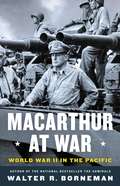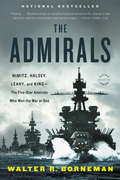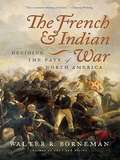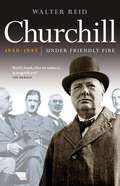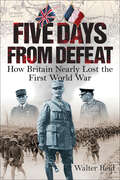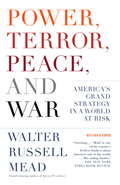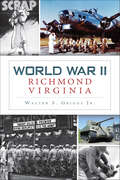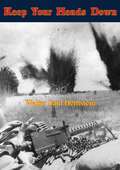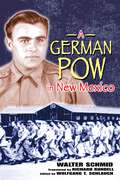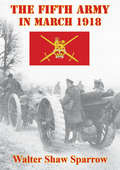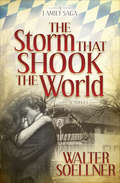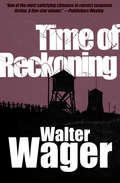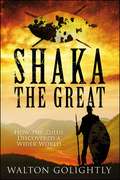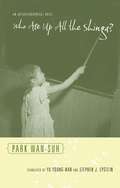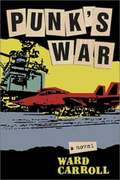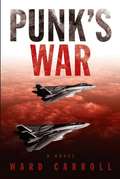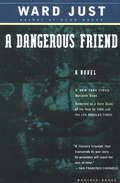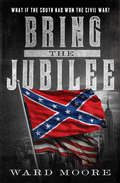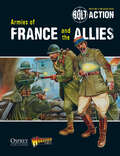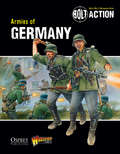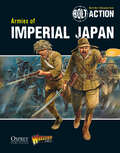- Table View
- List View
MacArthur at War: World War II in the Pacific
by Walter R. BornemanThe definitive account of General Douglas MacArthur's rise during World War II, from the author of the bestseller The Admirals.World War II changed the course of history. Douglas MacArthur changed the course of World War II. MACARTHUR AT WAR will go deeper into this transformative period of his life than previous biographies, drilling into the military strategy that Walter R. Borneman is so skilled at conveying, and exploring how personality and ego translate into military successes and failures.Architect of stunning triumphs and inexplicable defeats, General MacArthur is the most intriguing military leader of the twentieth century. There was never any middle ground with MacArthur. This in-depth study of the most critical period of his career shows how MacArthur's influence spread far beyond the war-torn Pacific.
The Admirals: Nimitz, Halsey, Leahy, and King--The Five-Star Admirals Who Won the War at Sea
by Walter R. BornemanHow history's only five-star admirals triumphed in World War II and made the United States the world's dominant sea power. Only four men in American history have been promoted to the five-star rank of Admiral of the Fleet: William Leahy, Ernest King, Chester Nimitz, and William Halsey. These four men were the best and the brightest the navy produced, and together they led the U. S. navy to victory in World War II, establishing the United States as the world's greatest fleet. In THE ADMIRALS, award-winning historian Walter R. Borneman tells their story in full detail for the first time. Drawing upon journals, ship logs, and other primary sources, he brings an incredible historical moment to life, showing us how the four admirals revolutionized naval warfare forever with submarines and aircraft carriers, and how these men-who were both friends and rivals-worked together to ensure that the Axis fleets lay destroyed on the ocean floor at the end of World War II.
The French and Indian War
by Walter R. BornemanIn the summer of 1754, deep in the wilderness of western Pennsylvania, a very young George Washington suffered his first military defeat, and a centuries-old feud between Great Britain and France was rekindled. The war that followed would be fought across virgin territories, from Nova Scotia to the forks of the Ohio River, and it would ultimately decide the fate of the entire North American continent--not just for Great Britain and France but also for the Spanish and Native American populations. Noted historian Walter R. Borneman brings to life an epic struggle for a continent--what Samuel Eliot Morison called "truly the first world war"--and emphasizes how the seeds of discord sown in its aftermath would take root and blossom into the American Revolution.
Tito, Mihailovic, and the Allies
by Walter R. RobertsThis new edition contains a new foreword by the author.
Churchill, 1940–1945: Under Friendly Fire
by Walter ReidThis &“magnificent&” account of Churchill&’s battles with allies &“is a meticulously researched history, but it is also a very moving human story&” (The Herald). In April 1945, Churchill said to Sir Alan Brooke, Chief of the Imperial General Staff, &“There is only one thing worse than fighting with allies, and that is fighting without them!&” When he became Prime Minister on May 10, 1940, Churchill was without allies. Dunkirk and the Battle of Britain saved Britain from immediate defeat, but it was evident that Britain alone could never win the war. Churchill looked to America. He said that until Pearl Harbor, &“no lover ever studied every whim of his mistress as I did those of President Roosevelt.&” But would Roosevelt have entered the war if Pearl Harbor had not taken place? Until then, his actions were ambivalent, and even afterward, America&’s policy was largely shaped by self-interest and its idea of what a post-war world should be like. Lend-Lease, for instance, was far from what Churchill publicly described as &“the most unsordid act in the history of any nation,&” but rather a tool of American policy. Churchill&’s account of relations with his allies and associates was sanitized for the historical record and has been accepted uncritically. In reality, he had to battle with the generals and the CIGS, Tory backbenchers and the War Cabinet, de Gaulle and the Free French, and—above all—the Americans. Even his wife, Clementine, could on occasion be remarkably unsupportive. He told his secretary, &“The difficulty is not in winning the war; it is in persuading people to let you win it—persuading fools.&” In this book, the acclaimed author of works on twentieth-century military history brings together the results of recent research to create a powerful narrative revealing how much time and energy devoted to fighting the war was excluded from the official accounts: the war with the allies.
Five Days from Defeat: How Britain Nearly Lost the First World War
by Walter ReidA historian explores &“with forensic precision&” the dramatic turning point that changed the course of the Great War (The Scotsman). On March 21, 1918, Germany initiated one of the most ferocious offensives of the First World War. During the so-called Kaiserschlacht, German troops advanced on Allied positions in a series of attacks that caused massive casualties, separated British and French forces, and drove the British back toward the Channel ports. Five days later, as the German advance continued, one of the most dramatic summits of the war took place in Doullens. The outcome was to have extraordinary consequences. For the first time, an Allied supreme commander—the French General Foch—was appointed to command all the Allied armies, while the statesmen realized that unity of purpose rather than national interest was ultimately the key to success. Within a few months, a policy of defense became one of offense, paving the way for British success at Amiens and the series of unbroken British victories that led Germany to plead for armistice. Victory in November 1918 was a matter for celebration; excised from history was how close Britain came to ignominious defeat just eight months earlier.
Power, Terror, Peace, and War
by Walter Russell MeadInternational affairs expert and award-winning author of Special Providence Walter Russell Mead here offers a remarkably clear-eyed account of American foreign policy and the challenges it faces post--September 11.Starting with what America represents to the world community, Mead argues that throughout its history it has been guided by a coherent set of foreign policy objectives. He places the record of the Bush administration in the context of America's historical relations with its allies and foes. And he takes a hard look at the international scene-from despair and decay in the Arab world to tumult in Africa and Asia-and lays out a brilliant framework for tailoring America's grand strategy to our current and future threats. Balanced, persuasive, and eminently sensible, Power, Terror, Peace, and War is a work of extraordinary significance on the role of the United States in the world today.From the Trade Paperback edition. Central Asia--threatens to create lawless, violent zones where terrorism can thrive, and weapons of mass destruction and biological and chemical weapons can proliferate.We learn why key American alliances have frayed and why the Bush administration's pronouncements and actions have ignited the most acrimonious U.S. political battles over foreign policy since the Vietnam War. Mead closes with a rigorous assessment of both Bush and his critics, and describes the urgent steps the United States must take lest casualties in the war on terror mount and the war itself spin out of control. He proposes a new approach to the war that can rebuild domestic and international support for a tough antiterror policy, outlines a new initiative for the Israeli-Palestinian dispute, and recommends sweeping changes for reforming international institutions, including the United Nations Security Council.Power, Terror, Peace, and War is a clear, concise guide to some of the most pressing issues before us, today and for the foreseeable future.From the Hardcover edition.
World War II Richmond, Virginia (Military)
by Walter S. Griggs Jr.The effects of the war raging across Europe were visible in Richmond as early as 1939, and Richmonders are always ready to fight for their cause. In that year, the city saw its first parking meters on the streets and began to collect aluminum scrap for use in war industries. In 1940, pursuant to the new draft law, Richmond's sons between the ages of twenty-one and thirty-five registered for the draft. While bomb shelters were put up all over the town, dances were held to maintain local morale. Even as local German families faced discrimination, Richmonders strived for a sense of unity and solidarity. Author and historian Walter Griggs Jr. revives this conflicted spirit, memorializing the sorrow and celebrating the triumphs of a resilient southern city through world war.
Keep Your Heads Down
by Walter Saul BernsteinA young American soldier, blessed with the sure touch of the "born" journalist and a deep personal understanding of what it means to be an active participant in this war, tells here the story of his three eventful years in camp and in combat.Beginning at Fort Benning, Georgia, on a fine afternoon in 1941 with the war three thousand miles away, and ending in Marshal Tito's headquarters in Yugoslavia in 1944, Sergeant Bernstein's war adventures have taken him to many fronts in many countries. While he was still in the United States he served with the famous 8th Infantry of the 4th Infantry Division, watched the paratroopers train, did publicity for This Is the Army. Then came two months on a freighter as guest of the U.S. Army. He was with a regimental intelligence detachment in Italy, and did reconnaissance work in Sicily. Once he was lost from his regiment and wandered about alone, seeking his, outfit, through the terribly dangerous battle area.He marched into Yugoslavia with fifty Partisans to Marshal Tito's headquarters. They climbed tortuous mountain trails and crossed through German-occupied territory for seven days. Bernstein was the first correspondent to interview Tito.These experiences are exciting in themselves, and Bernstein is a skilled and sensitive reporter who presents his story in an enviably simple and graphic manner, without heroics or sentimentality. He is not just a correspondent writing about the men who are fighting for us. He is himself one of them.
A German POW in New Mexico (Historical Society of New Mexico Publication Series)
by Walter SchmidWalter Schmid, a member of Rommel's Afrika Korps, was one of hundreds of thousands of POWs interned in the United States during World War II. Drafted into the German army at twenty, he had fought for only five months when captured in Tunisia in May 1943. Schmid was sent first to POW camps in Oklahoma (Gruber, Bixby, and McAlester) and was soon transferred to New Mexico in July 1944.Walter Schmid worked in southern New Mexico's Mesilla Valley picking cotton and harvesting melons alongside Mexican-American laborers. He recalls playing trumpet in the camp orchestra and watching Sunday soccer games between the teams of rival POW camps. Based on his diary and the letters he sent home to his German girlfriend, whom he later married, Schmid's memoir was published in Germany in 2000. This abbreviated English translation begins with his capture in North Africa and his voyage to the United States and ends with his work experience in England, where he was transferred after almost three years of captivity in the United States, and his return to Germany in 1947.
Final Verdict: What Really Happened in the Rosenberg Case
by Walter SchneirA new narrative of the famed case that finally solves its remaining mysteries, by the author of the bestselling Invitation to an Inquest. Walter and Miriam Schneir's 1965 bestseller Invitation to an Inquest was among the first critical accounts of the controversial case of Julius and Ethel Rosenberg, famously executed in 1953 for passing atom bomb secrets to Soviet Russia. In Invitation the Schneirs presented exhaustive and damning evidence that key witnesses in the trial had changed their stories after coaching from prosecutors, and that the FBI had forged evidence. The conclusion was unavoidable: The Rosenbergs were innocent. But were they? Thirty years after the publication of Inquest, Walter Schneir was back on the case after bits and pieces of new evidence started coming to light, much of it connecting Julius Rosenberg to Soviet espionage. Over more than a decade, Schneir continued his search for the truth, meeting with former intelligence officials in Moscow and Prague, and cross checking details recorded in thousands of government documents. The result is an entirely new narrative of the Rosenberg case. The reality, Schneir demonstrates, is that Rosenbergs ended up hopelessly trapped: prosecuted for atomic espionage they didn't commit--but unable to admit earlier espionage activities during World War II. As it happened, Julius Rosenberg was only marginally involved in the atomic spy ring he was depicted as leading--while Ethel, critically, was not at all involved. The two lied when the contended they knew nothing about espionage. Ethel knew about it and Julius had practiced it, but the government's contention that they had stolen the "secret" of the atom bomb was critically and fatally flawed.
The Fifth Army In March 1918 [Illustrated Edition]
by Walter Shaw Sparrow[Illustrated with 19 maps]On March 21st, 1918, Ludendorff launched the massive offensive that had been feared by the Allies for some time. The target for their attack was the Fifth Army commanded by General Sir Hubert Gough; weak in numbers and even weaker in the lack of entrenchments and fortifications in the front line which they had only just taken over from French divisions. The effect was shattering, the 'hurricane bombardment' was murderous the Germans fired one million artillery shells at the British lines held by the Fifth Army - over 3000 shells fired every minute. The famous Stormtroopers, specially trained and equipped, attacked with skill and determination, bypassing islands of resistance, sowing terror with flame-throwers rushing towards their objectives. The Fifth army fought valiantly and suffered greatly and no less than 21,000 British soldiers had been captured, many still stupefied by the bombardment, and, much ground that had been bought at huge human cost during the Battle of the Somme, lost. However, the shell-holed ground of the Somme battlefield proved to be the best ally of the British as it slowed the German advance; starving German troops stopped to loot abandoned British supplies. As the Germans slowed the remaining troops of Fifth and the other British Armies stiffened their resistance and eventually the front was knitted back together with the aid of the French and American forces.It was to be the last roll of the dice for the German Army in the First World War, the last real chance of victory, almost a quarter of a million of their best soldiers fell on their side during March and April 1918. The Gamble had failed however and the Allies would turn back the tide a few months later hounding the Germans back to their own borders and final capitulation.
The Storm That Shook the World: A Novel
by Walter SoellnerThe author of Kalvarianhof: The Perilous Journey continues his sweeping family saga with a novel of adventure and romance in Germany and war-torn Africa. Family friends for generations, Catholic Markus and Jewish Levi—young men newly home from adventures in China—find themselves and their ladies living the last wonderfully romantic days of the Belle Epoch, the Beautiful Era, before the beginning of the first World War in 1914. The two men are soon swept up by the Great War, and find themselves far from the trenches of France, but no less safe in the wilds and on the battlefields as soldiers in Kaiser Wilhelm&’s African colonies. While Markus and Levi risk their lives in the face of betrayal and terror, a new normal exists back at Kalvarianhof, the grand Levi estate deep in the forests of Bavaria. The loved ones left behind struggle with hardships and dangers unforeseen, as the shadow of war threatens their friendships, their families, and their fate.
Memoirs of Emma, Lady Hamilton The Friend of Lord Nelson and The Court of Naples
by Walter Sydney SichelHere we have presented the remarkable life-story of Emma, Lady Hamilton -a story which transcends the bounds of romance and fascinates and baffles the reader by turns. Indeed, no two critics of this famous beauty and confidante of Lord Nelson have ever agreed as to her place in history. To one she is an adventuress, luring Nelson on by the sheer power of her physical charm; to another, she is his guiding star, his inspiration; while others see in her merely an astute politician, eager for power.-Print ed.
Time of Reckoning
by Walter WagerA breakneck thriller by the author of 58 Minutes, the basis of the blockbuster film Die Hard 2. Ernest Beller stands at the end of a giant pit, watching as the Americans who liberated Dachau are trying to bury the countless bodies they have found. Nine years later, Beller still sees those bodies . . . and the guilty men who got away. An intricate psychological thriller, Walter Wager&’s stunning novel explores the nature of vengeance and the corrosive trauma of the Holocaust on generations of men. With a breakneck pace, Wager hits boiling point as a government agent begins investigating the murders of former Nazis—and sees the horror and the justice in the worst of acts. &“One of the most satisfying climaxes in current suspense fiction. A five-star winner.&” —Publishers Weekly
Shaka the Great
by Walton Golightly1826: Shaka, king of the Zulus, has consolidated his power and is ready to move against those who continue to resist his authority. But now a new tribe has appeared, and white men from across the Great Water, claiming they wish to trade with Shaka. These white men may seem puny, and their ways strange, but Shaka believes there's more to them than meets the eye. Obsessed with divining their secrets, however, he becomes oblivious to the threat growing from within his own court.Seething with sorcery and betrayal, battles and intrigue, triumph and tragedy, Shaka the Great sees one of the greatest leaders of all time consolidate his power as the first Europeans begin to arrive on the African continent. It takes us to an empire at its zenith, in a time when the name Zulu began to echo around the world as a byword for courage and nobility.
Who Ate Up All the Shinga?: An Autobiographical Novel (Weatherhead Books on Asia)
by Wan-Suh ParkPark Wan-suh is a best-selling and award-winning writer whose work has been widely translated and published throughout the world. Who Ate Up All the Shinga? is an extraordinary account of her experiences growing up during the Japanese occupation of Korea and the Korean War, a time of great oppression, deprivation, and social and political instability.Park Wan-suh was born in 1931 in a small village near Kaesong, a protected hamlet of no more than twenty families. Park was raised believing that "no matter how many hills and brooks you crossed, the whole world was Korea and everyone in it was Korean." But then the tendrils of the Japanese occupation, which had already worked their way through much of Korean society before her birth, began to encroach on Park's idyll, complicating her day-to-day life. With acerbic wit and brilliant insight, Park describes the characters and events that came to shape her young life, portraying the pervasive ways in which collaboration, assimilation, and resistance intertwined within the Korean social fabric before the outbreak of war. Most absorbing is Park's portrait of her mother, a sharp and resourceful widow who both resisted and conformed to stricture, becoming an enigmatic role model for her struggling daughter. Balancing period detail with universal themes, Park weaves a captivating tale that charms, moves, and wholly engrosses.
Punk's War
by Ward CarrollAn F-14 aviator takes his readers into the cockpits, ready-rooms, and bunkrooms of today's Navy to show what it's like to fight in a time of so-called peace.
Punk's War
by Ward CarrollAn F-14 aviator takes his readers into the cockpits, ready-rooms, and bunkrooms of today's Navy to show what it's like to fight in a time of so-called peace. From the opening chapter where a Tomcat fighter squadron's commanding officer botches an intercept of a hostile Iranian F-4 to the final uplifting scene, his novel reveals the inner workings of the military as only an insider can. It is a thriller without an airshow groupie's pretense, a fighter pilot's story as honest as it is riveting. The action is gripping and authentic, yet it punctuates rather than drives the plot. Seldom has fiction been so real.Punk's War is part adventure tale, part introspective commentary. Adopting the tone of the quixotic lieutenants who populate its pages, the novel helps us understand the pressures on this new generation of warfighters. Along the way we are introduced to an engaging cast of characters: a self-centered careerist squadron commander hell-bent on fixing his tainted professional reputation; a reluctant air-wing commander more suited for life within the walls of the Pentagon than on a flight deck at sea; a battle-group commander reared in the art of driving ships, but thrust into the snap decision matrix of supersonic jets; and a host of junior officers. Seeking only the ideals they were promised, these technology-savvy aviators are products of pop culture, unimpressed by rank for its own sake and unresponsive to petitions in the name of the profession's lofty mottos. Unlike other books about the business of flying from aircraft carriers, this novel provides serious food for thought about leadership and retention--what motivates young people to keep doing what they do despite the dangers, disappointments, and personal sacrifices. Best-selling novelist Stephen Coonts describes the author as Tom Clancy crossed with Joseph Heller, his book as a refreshing twist on the military thriller.
A Dangerous Friend: A Novel
by Ward JustNAMED A BEST BOOK OF THE YEAR BY TIME AND THE LOS ANGELES TIMES • A NEW YORK TIMES NOTABLE BOOK&“A literary triumph that transcends its war story. . . its greatness will stand the test of time.&”—San Francisco Chronicle &“A master American novelist.&” —Vanity FairA Dangerous Friend is a thrilling narrative roiling with intrigue, mayhem, and betrayal. Here is the story of conscience and its consequences among those for whom Vietnam was neither the right fight nor the wrong fight but the only fight. The exotic tropical surroundings, the coarsening and corrupting effects of a colonial regime, the visionary delusions of the American democratizers, all play their part. A few civilians with bright minds and sunny intentions want to reform Vietnam—but the Vietnam they see isn't the Vietnam that is. Sydney Parade, a political scientist, has left home and family in an effort to become part of something larger than himself, a foreign-aid operation in Saigon. Even before he arrives, he encounters French and Americans who reveal to him the unsettling depths of a conflict he thought he understood—and in Saigon, the Vietnamese add yet another dimension. Before long, the rampant missteps and misplaced ideals trap Parade and others in a moral crossfire.
Exiles In The Garden
by Ward Just"One of the most astute writers of American fiction" (New York Times Book Review) delivers the resonant story of Alec Malone, a senator’s son who rejects the family business of politics for a career as a newspaper photographer. Alec and his Swiss wife, Lucia, settle in Georgetown next door to a couple whose émigré gatherings in their garden remind Lucia of all the things Americans are not. She leaves Alec as his career founders on his refusal of an assignment to cover the Vietnam War — a slyly subversive fictional choice from Ward Just, who was himself a renowned war correspondent. At the center of the novel is Alec’s unforeseen reckoning with Lucia’s long-absent father, Andre Duran, a Czech living out the end of his life in a hostel called Goya House. Duran’s career as an adventurer and antifascist commando is everything Alec’s is not. The encounter forces Alec to confront just how different a life where things — "terrible things, terrible things" — happen is from a life where nothing much happens at all. Once again, "Ward Just writes the kind of books they say no one writes anymore: smart, well-crafted narratives — wise to the ways of the world — that use fiction to show us how we live" (Joseph Kanon, Los Angeles Times).
Bring the Jubilee: What if the South Had Won the Civil War?
by Ward MooreWhat if the South Had Won the Civil War?The landmark alternate history novel by &“one of the best American writers&” (Ray Bradbury). In the world of this novel, said to be an inspiration for Philip K. Dick&’s The Man in the High Castle, the Confederacy has triumphed and become an imperialist nation. What is left of the United States has been drained of its resources and is trapped in a depression. Hodge, a young man living in a village in rural New York with his parents, decides to head to the city to escape his otherwise inevitable future of poverty and indentured servitude. But the specter of war between the Confederacy and the other great global power, the German Union, haunts the entire region, and a nationalist terrorist group has other plans for Hodge. Before long, he is swept up in the politics of the day and becomes involved with a beautiful physicist who is working on a machine intended to change his fate—and the fate of the world. Long before Harry Turtledove&’s The Guns of the South, Bring the Jubilee was the first novel to pose the question &“What if the South had won the Civil War?&” A counterfactual classic, it was included in renowned science fiction editor David Pringle&’s list of the 100 Best Science Fiction Novels. This ebook features an illustrated biography of Ward Moore including rare images from the author&’s estate.
Bolt Action: Armies of France and the Allies
by Warlord GamesWorld War II was truly a 'world' war, and many nations joined the fight against Germany and the Axis. This latest supplement for Bolt Action covers the armies of France, Poland, Czechoslovakia, Denmark, Norway, Holland and Belgium that stood against the German Blitzkrieg, as well as the resistance forces that sprung up in the aftermath of occupation, and other Allied powers, such as China, in the East.
Bolt Action: Armies of Germany
by Warlord GamesHitler's Nazi German blitzkrieg swept across Poland, Norway, Denmark, France, Yugoslavia, Greece, North Africa, and Russia with Panzers, Stukas, Fallschirmjaeger, infantry, and artillery. This book provides Bolt Action players with all of the information they need to field the military forces of Nazi Germany. Detailed army lists allow players to construct German armies for any theatre and any year of the war, including the early campaigns in Poland and France, the dusty tank war in the North African desert, the bloody battles on the Eastern Front, and the final defence of Normandy, occupied France and Germany itself. With dozens of different unit types including Fallschirmjager, Waffen-SS, and the dreaded Tiger tank, players can assemble a huge variety of troops with which to battle their opponents.
Bolt Action: Armies of Imperial Japan
by Warlord GamesFollowing the assault on Pearl Harbor, the Imperial Japanese military saw action across Asia, from the capture and defense of the islands of the Pacific to the occupation of territory in China and Burma. With this latest supplement for Bolt Action, players have all the information they need to build a force of the Emperor's fanatically loyal troops and campaign through some of the most brutal battles of the war.
